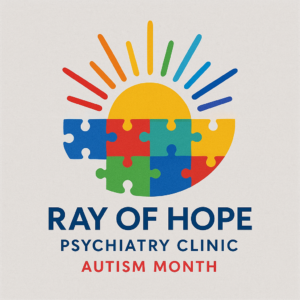April is Autism Awareness Month, dedicated to fostering understanding, acceptance, and support for individuals on the autism spectrum. Despite growing awareness, autism remains widely misunderstood.
What is Autism?
Autism Spectrum Disorder (ASD) is a neurodevelopmental condition affecting communication, social interactions, and behavior. The term “spectrum” reflects the wide range of abilities and challenges autistic individuals experience. While some excel in areas like mathematics, music, or art, others may need support with daily activities.
The Rising Prevalence of Autism
Over the past few decades, autism diagnoses have increased significantly due to improved awareness, better diagnostic tools, and broader diagnostic criteria. Today, approximately 1 in 68 individuals are diagnosed with ASD, with a higher prevalence in males.
Challenges Faced by Autistic Individuals
- Communication Barriers: Difficulty with verbal and non-verbal communication.
- Social Interaction Difficulties: Trouble understanding social cues and norms.
- Sensory Sensitivities: Heightened or diminished responses to sensory inputs like sounds, lights, or textures.
- Limited Accessibility in Education and Workplaces: Many institutions fail to accommodate autistic individuals, limiting opportunities.
- Mental Health Challenges: Higher rates of anxiety, depression, and co-occurring conditions.
Debunking Common Myths About Autism
- 🚫 Myth: Autism is a disease.
✅ Fact: Autism is not an illness; it is a different way of experiencing the world. - 🚫 Myth: People with autism lack emotions.
✅ Fact: Autistic individuals express emotions differently, but their feelings are genuine. - 🚫 Myth: Vaccines cause autism.
✅ Fact: Scientific research confirms no link between vaccines and autism. - 🚫 Myth: Autism only affects children.
✅ Fact: Autism is a lifelong condition; more autistic adults exist than children.
Strategies for Parenting an Autistic Child
- Early Intervention: Support from a young age improves skill development.
- Understanding Sensory Needs: Creating a sensory-friendly home environment reduces stress.
- Effective Communication Strategies: Alternative methods like sign language or assistive technology can be helpful.
- Routine and Structure: Maintaining a predictable schedule reduces anxiety.
- Encouraging Strengths: Fostering passions in art, science, or technology builds confidence.
- Building Social Skills: Role-playing and social stories can enhance interaction skills.
- Seeking Support: Joining parenting support groups and consulting professionals can provide guidance and reassurance.
Supporting Autism Awareness and Acceptance
Raising awareness is just the beginning—true inclusion comes from understanding and embracing neurodiversity. Let’s work together to build a more accepting society for autistic individuals and their families.

Autism Speaks – Resources & Support https://www.autismspeaks.org
